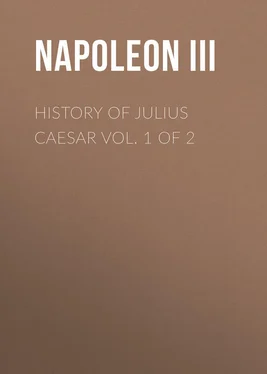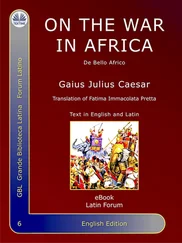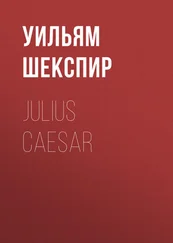Napoleon III - History of Julius Caesar Vol. 1 of 2
Здесь есть возможность читать онлайн «Napoleon III - History of Julius Caesar Vol. 1 of 2» — ознакомительный отрывок электронной книги совершенно бесплатно, а после прочтения отрывка купить полную версию. В некоторых случаях можно слушать аудио, скачать через торрент в формате fb2 и присутствует краткое содержание. Жанр: foreign_antique, foreign_prose, Биографии и Мемуары, на английском языке. Описание произведения, (предисловие) а так же отзывы посетителей доступны на портале библиотеки ЛибКат.
- Название:History of Julius Caesar Vol. 1 of 2
- Автор:
- Жанр:
- Год:неизвестен
- ISBN:нет данных
- Рейтинг книги:5 / 5. Голосов: 1
-
Избранное:Добавить в избранное
- Отзывы:
-
Ваша оценка:
- 100
- 1
- 2
- 3
- 4
- 5
History of Julius Caesar Vol. 1 of 2: краткое содержание, описание и аннотация
Предлагаем к чтению аннотацию, описание, краткое содержание или предисловие (зависит от того, что написал сам автор книги «History of Julius Caesar Vol. 1 of 2»). Если вы не нашли необходимую информацию о книге — напишите в комментариях, мы постараемся отыскать её.
History of Julius Caesar Vol. 1 of 2 — читать онлайн ознакомительный отрывок
Ниже представлен текст книги, разбитый по страницам. Система сохранения места последней прочитанной страницы, позволяет с удобством читать онлайн бесплатно книгу «History of Julius Caesar Vol. 1 of 2», без необходимости каждый раз заново искать на чём Вы остановились. Поставьте закладку, и сможете в любой момент перейти на страницу, на которой закончили чтение.
Интервал:
Закладка:
Results obtained by Royalty.
V. The facts which precede are sufficient to convince us that the Roman Republic 75 75 We employ intentionally the word republic , because all the ancient authors give this name to the State, under the kings as well as under the emperors. It is only by translating faithfully these denominations that we can form an exact idea of ancient societies.
had already acquired under the kings a strong organisation. 76 76 “We acknowledge how many good and useful institutions the Republic owed to each of our kings.” (Cicero, De Republica , II. 21.)
Its spirit of conquest overflowed beyond its narrow limits. The small states of Latium which surrounded it possessed, perhaps, men as enlightened and citizens equally courageous, but there certainly did not exist among them, to the same degree as at Rome, the genius of war, the love of country, faith in high destinies, the conviction of an incontestible superiority, powerful motives of activity, instilled into them perseveringly by great men during two hundred and forty-four years.
Roman society was founded upon respect for family, for religion, and for property; the government, upon election; the policy, upon conquest. At the head of the State is a powerful aristocracy, greedy of glory, but, like all aristocracies, impatient of kingly power, and disdainful towards the multitude. The kings strive to create a people side by side with the privileged caste, and introduce plebeians into the Senate, freedmen among the citizens, and the mass of citizens into the ranks of the soldiery.
Family is strongly constituted; the father reigns in it absolute master, sole judge 77 77 “Among the Romans, the children possess nothing of their own during their father’s life. He can dispose not only of all the goods, but even of the lives of his children.” (Dionysius of Halicarnassus, VIII. 79; II. 25.)
over his children, his wife, and his slaves, and that during all their lives: yet the wife’s position is not degraded as among the barbarians; she enjoys a community of goods with her husband; mistress of her house, she has the right of acquiring property, and shares equally with her brothers the paternal inheritance. 78 78 Dionysius of Halicarnassus, II., 25, 26. – “From the beginning,” says Mommsen, “the Roman family presented, in the moral order which reigned among its members, and their mutual subordination, the conditions of a superior civilisation.” ( Roman History , 2nd edit., I., p. 54.)
The basis of taxation is the basis of recruiting and of political rights; there are no soldiers but citizens; there are no citizens without property. The richer a man is, the more he has of power and dignities; but he has more charges to support, more duties to fulfil. In fighting, as well as in voting, the Romans are divided into classes according to their fortunes, and in the comitia, as on the field of battle the richest are in the first ranks.
Initiated in the apparent practice of liberty, the people is held in check by superstition and respect for the high classes. By appealing to the intervention of the Divinity in every action of life, the most vulgar things become idealised, and men are taught that above their material interests there is a Providence which directs their actions. The sentiment of right and justice enters into their conscience, the oath is a sacred thing, and virtue, that highest expression of duty, becomes the general rule of public and private life. 79 79 “Morals were so pure that, during two hundred and thirty years, no husband was known to repudiate his wife, nor any woman to separate from her husband.” (Plutarch, Parallel of Theseus and Romulus .)
Law exercises its entire empire, and, by the institution of the feciales, international questions are discussed with a view to what is just, before seeking a solution by force of arms. The policy of the State consists in drawing by all means possible the peoples around under the dependence of Rome; and, when their resistance renders it necessary to conquer them, 80 80 Cicero admires the profound wisdom of the first kings in admitting the conquered enemies to the number of the citizens. “Their example,” he says, “has become an authority, and our ancestors have never ceased granting the rights of citizens to conquered enemies.” ( Oration for Balbus , xxxi.)
they are, in different degrees, immediately associated with the common fortune, and maintained in obedience by colonies – advanced posts of future dominion. 81 81 Roman colonies (coloniæ civium cum jure suffragii et honorum). – First period: 1-244 (under the kings). Cænina (Sabine). Unknown. Antemnæ (Sabine). Unknown. Cameria (Sabine). Destroyed in 252. Unknown. Medullia (Sabine). Sant’-Angelo . – See Gell., Topogr. of Rome , 100. Crustumeria (Sabine). Unknown. Fidenæ (Sabine). Ruins near Giubileo and Serpentina . Re-colonised in 326. Destroyed, according to an hypothesis of M. Madvig. Collatia. Ostia (the mouth of the Tiber). Ruins between Torre Bovacciano and Ostia . Latin colonies (coloniæ Latinæ). – First period: 1-244 (under the kings). We cannot mention with certainty any Latin colony founded at this epoch, from ancient authorities. The colonies of Signia and Circeii were both re-colonized in the following period, and we shall place them there.
The arts, though as yet rude, find their way in with the Etruscan rites, and come to soften manners, and lend their aid to religion; everywhere temples arise, circuses are constructed, 82 82 “Tarquin embellished also the great circus between the Aventine and Palatine hills; he was the first who caused the covered seats to be made round this circus.” (Dionysius of Halicarnassus, III. 68.)
great works of public utility are erected, and Rome, by its institutions, paves the way for its pre-eminence.
Almost all the magistrates are appointed by election; once chosen, they possess an extensive power, and put in motion resolutely those two powerful levers of human actions, punishment and reward. To all citizens, for cowardice before the enemy or for an infraction of discipline, 83 83 Titus Livius, I. 44. – “Immediately the centurions, whose centuries had taken flight, and the antesignani who had lost their standard, were condemned to death: some had their heads cut off; others were beaten to death. As to the rest of the troops, the consul caused them to be decimated; in every ten soldiers, he upon whom the lot fell was conducted to the place of execution, and suffered for the others. It is the usual punishment among the Romans for those who have quitted their ranks or abandoned their standards.” (Dionysius of Halicarnassus, IX. 1.)
the rod or the axe of the lictor; to all, for noble actions, crowns of honour; 84 84 “Romulus placed upon their hair a crown of laurels.” (Plutarch, Romulus , XX.)
to the generals, the ovation, the triumph, 85 85 “The Senate and the people decreed to King Tarquin the honours of the triumph.” ( Combat of the Romans and Etruscans , Dionysius of Halicarnassus, III. 60.) – “An ovation differs from a triumph, first, because he who receives the honours of it enters on foot at the head of the army, and not mounted in a car; secondly, that he has neither the crown of gold, nor the toga embroidered with gold and of different colours, but he carries only a white trabea bordered with purple, the ordinary costume of the generals and consuls. Besides having only a crown of laurel, he does not carry a sceptre. This is what the little triumph has less than the great; in all other respects there is no difference.” (Dionysius of Halicarnassus, V. 47.)
the best of the spoils; 86 86 Romulus kills Acron, routs the enemies, and returns to offer to Jupiter Feretrius the opima spolia taken from that prince . “After Romulus, Cornelius Cossus was the first who consecrated to the same gods similar spoils, having slain with his own hand, in a combat where he commanded the cavalry, the general of the Fidenates. “We must not separate the example of M. Marcellus from the two preceding. He had the courage and intrepidity to attack on the banks of the Pô, at the head of a handful of horsemen, the king of the Gauls, though protected by a numerous army; he struck off his head, and carried off his armour , of which he made an offering to Jupiter Feretrius. (Year of Rome 531.) “The same kind of bravery and combat signalised T. Manilius Torquatus, Valerius Corvus, and Scipio Æmilianus. These warriors, challenged by the chieftains of the enemies, made them bite the dust; but, as they had fought under the auspices of a superior chief, they did not offer their spoils to Jupiter.” (Year of Rome 392, 404, 602.) (Valerius Maximus, III. 2, §§ 3, 4, 5, 6.)
to the great men, apotheosis. To honour the dead, and for personal relaxation after their sanguinary struggles, the citizens crowd to the games of the circus, where the hierarchy gives his rank to each individual. 87 87 “Tarquin divided the seats (of the great circus) among the thirty curiæ, assigning to each the place which belonged to him.” (Dionysius of Halicarnassus, III. 68.) – “It was then (after the war against the Latins) that the site was chosen which is now called the great circus. They marked out in it the particular places for the senators and for the knights.” (Titus Livius, I. 35.)
Интервал:
Закладка:
Похожие книги на «History of Julius Caesar Vol. 1 of 2»
Представляем Вашему вниманию похожие книги на «History of Julius Caesar Vol. 1 of 2» списком для выбора. Мы отобрали схожую по названию и смыслу литературу в надежде предоставить читателям больше вариантов отыскать новые, интересные, ещё непрочитанные произведения.
Обсуждение, отзывы о книге «History of Julius Caesar Vol. 1 of 2» и просто собственные мнения читателей. Оставьте ваши комментарии, напишите, что Вы думаете о произведении, его смысле или главных героях. Укажите что конкретно понравилось, а что нет, и почему Вы так считаете.












